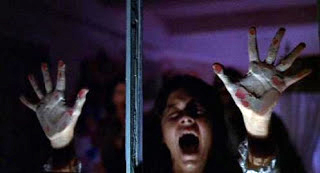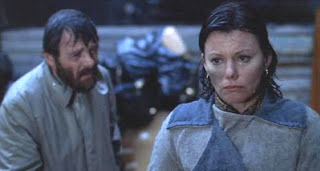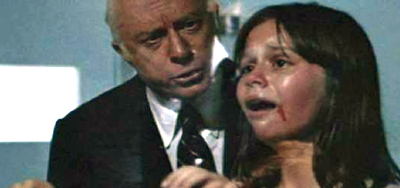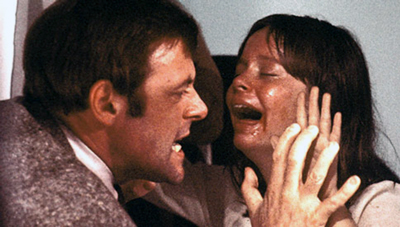
 |
|
|
|
I think I've figured out the boundaries for my enthusiasm for horror films. Tell me a scary story about ghosts and hauntings. You can make it gory or obscene if you must. It can be about religion and it can even involve harm to small children, if you don't seem to be reaching out to child molesters. But if your story is about the supernatural, just don't insist that it's real. Accomplished director Robert Wise did some good work in the last decade of his career, but his low point must be 1977's Audrey Rose, one of the more ill-judged major projects to grace the filmography of any aging director. Riding on the coattails of the success of The Exorcist, screenwriter Frank De Felitta adapts his own novel about a similar possession that takes its own path. The movie is practically an infomercial for the belief in reincarnation. There's a difference between movies that are about superstition and movies that are in themselves superstitious. Audiences for this picture were surprised when, instead of a horror movie, they were handed a spiritual sales job. 
The Exorcist's barrage of outrages excited viewers that like the idea of shocking people out of their skins, even if its extreme audiovisual brutality pummeled the faith-minded audience most vulnerable to spiritual low blows. Audrey Rose's only excitement is the spectacle of seeing a young girl psychologically traumatized. Being asked to consider reincarnation (a fascinating spiritual idea) for the sake of a story is one thing, but Audrey Rose wants us to believe it 100%, and sign up right now. I think it does Eastern faiths a disservice, pushing reincarnation on the audience as if it were snake oil. Some critical praise called the film 'disturbing', which one would hope is a natural reaction to a film that victimizes a small child. Janice and Elliott Templeton (Marsha Mason & John Beck) have a fine marriage except that their young daughter Ivy (Susan Swift) has suffered nightmares around her birthday for a couple of years. Then the odd Elliot Hoover (Anthony Hopkins) comes into their lives. Hoover's daughter Audrey Rose died ten years before, on the same day and hour that Ivy was born. Through two clairvoyants and years 'learning the truth of reincarnation' in India, he's decided that Ivy is really Audrey Rose, and since Audrey Rose is still traumatized by her violent and fiery death in a car accident, Ivy's recurrent terrors will continue until the soul she inherited from Audrey Rose is set free. The Templetons resist Hoover as a nut but unexplainable phenomena and Hoover's own sincerity eventually convince Janice that everything he says is real. Hoover keeps showing up at Audrey's door when she's in trouble, and after a fight with Elliott, he steals her away to his apartment. On trial for this kidnapping, Hoover gets a break when Janice testifies on his behalf. Meanwhile, all this agitation has little Ivy convinced she's possessed by the spirit of a girl from beyond the grave. She tries to hurt herself at school. By now the Templetons have broken up and Ivy is in a hospital. To get at the 'truth', Elliott and his lawyer Scott Velie (John Hillerman) engage expert Dr. Lipscomb (Norman Lloyd) to hypnotize Ivy in front of the entire court. 
Someone must have thought Robert Wise perfect to direct Audrey Rose; he'd had great success elevating horror films to a higher level. He's always given major credit for the classic The Curse of the Cat People, a remarkably sensitive movie about a disturbed child. 1 Audrey Rose repeatedly references The Exorcist: Ivy talks precociously about menstruation, she suddenly turns psychotic, and those useless doctors just don't have any answers. There are also hints of Wise's own The Haunting, in an occasional composition and Wise's visual emphasis on the gargoyles outside their apartment windows. Compared to the relative hipsters the Woodhouses in Rosemary's Baby, the Templetons are pretty ordinary upscale citizens. But both couples' children are the ones that suffer. How the filmmakers thought Audrey Rose would be accepted by anybody even contemplating becoming a parent is beyond me. The Templetons invite this suspicious stranger Hoover into their house, when he might be a conman with any number of schemes up his sleeve. That they allow him access to Ivy is insane. Kids are highly suggestible, and keenly sensitive to psychological disturbances. For all they know Hoover's talk could be a front for a crazy murder mission. The movie cheats to make the sincere, spiritual Hoover the answer to everything -- he's the one who brings Ivy safely home from school, he's the only one who can calm her down, he's the man with the answers. Poor lamebrain husband Elliott asks for advice from a lawyer friend, and for his trouble gets only a lot of talk about Jewish supernatural fetishes. And the cops won't check out a suspicious stalker when a small child is involved? Not even in New York does that happen, at least not to affluent uptown folk. 
Dad loses his wife and his family because Janice defects to the side of a man who can soothe Ivy's outbursts. Janice is a Catholic, with the kind of upbringing exploited by William Peter Blatty. But instead of running to Father Merrin for help, she abdicates her role as mother and protector to this benign guru with the English accent. Meanwhile, Ivy is really going nuts. We'd say that this is one case where some careful medication might help, but that would put us in the category of irrelevant nabobs that would like to try a scientific approach, you know, those foolish doctors. All that tedious rationalism was thoroughly discounted in The Exorcist, remember? Of course, nobody and nothing explains the burns on Audrey's hands, unless she burned them herself before the adults arrive. Where exactly does that bit of supernatural violence fit in? Where in Indian religion or reincarnation lore is there taught anything about mutilating children? Some reviewers have questioned the trial scenes, where a court of law expects a jury to actually consider an issue of faith in a legal matter. Reincarnation is on trial, not Hoover, and reincarnation wins by a mile. It's like putting Santa Claus on trial in Miracle on 34th Street, except that movie makes some sense if you think of Santa as a blacklist victim. And what bozo would expect anybody -- judge, the defense or the prosecutor -- to consider putting a child with Ivy's very active psychological disturbances under hypnosis to determine 'the truth?' What truth, that her soul isn't her own? Smartly directed and very well acted, Audrey Rose is more insulting than the crazy religious-political movies like Red Planet Mars. It doesn't make enough sense to be a skit on Saturday Night Live: "Hi, you don't know me, but my dead daughter's soul is trapped in your daughter's body. Your daughter's body needs to die to set my daughter's soul free." 
Audrey Rose is slickly produced. Marsha Mason is intensely sympathetic until she throws in the towel and surrenders her daughter and her own will over to the voodoo baloney. The Polynesian version: "Hi you lucky woman! I can see you love your daughter, and the Gods want us to throw her in the volcano!" The poor father played by John Beck makes a few wrong moves and is suddenly the villain of the piece - he should simply give Janice a quick divorce and suggest she marry Hoover. Little Susan Swift does everything right but is a prisoner of the script -- even when she smiles she looks nuts. As is usual, Anthony Hopkins is sensationally good, amazingly sincere, sympathetic and humble. But I'd still bash Hoover's brains in if he came after my kid. Hopkins propped up a fairly limp horror effort (Magic from 1978) and clearly had faith in good horror characters, for he eventually found his way to The Silence of the Lambs. Like I said, Audrey Rose offers horror fans only the all-too convincing psychological abuse of a little girl, and the audience for that particular subgenre isn't big. In fact, putting little kids in danger has always been a tricky entertainment strategy. The font style for the title, the gothic poster, the unexplainable burns -- Audrey Rose tries to sell a spiritual bill of goods with the trappings of an old-fashioned gothic horror film. I must believe that Eastern holy men that would like to see the whole world embrace reincarnation, would not approve of this weird sales job. 2 The Twilight Time Blu-ray of Audrey Rose looks very good. In the early scenes Wise goes for what he thinks is a natural look, shooting into the sun in Central Park, etc. The opening car crash is also nice in the way it comes out of nowhere. Victor J. Kemper's cinematography feels natural in the Templeton's handsome apartment. The show looks great all around. 
The disc has an extra Isolated Score track of Michael Small's melancholy and ominous music. At one point the film zooms into Anthony Hopkins' temple to show a montage of views of Indians bathing in the Ganges, accompanied by sitar music. The trailer goes for the full-court press with scary shots of Ivy in danger, etc; but no mention of the film's odd religious agenda. Julie Kirgo's liner notes open with a discussion of Robert Wise's career and then tread lightly around the film's contentious issues. It's difficult writing liner notes that are good criticism yet flattering to the film being sold; that's a problem of commercial art, not the writer. 3
On a scale of Excellent, Good, Fair, and Poor,
Audrey Rose Blu-ray rates:
Footnotes:
1. Gunther von Fritsch is never remembered in the context of the Val Lewton classic, even though Robert Wise replaced him deep into the filming schedule. West Side Story is another case in which Wise finished a movie (after starting as a co-director) and received the lion's share of the credit.
2. Is it any less offensive if I hide my alternate title for Audrey Rose way down here in a footnote? ... it's Kramer vs. Bhagavad-Gita. I'd like to think that I'm defending the dignity of devout Hindus and Buddhists, despite not knowing much about them.
3. Frank De Felitta is also the author of The Entity, which makes a case for traditional haunting-possessions, this time with a highly marketable sexual aspect. I am told that De Felitta's books are well written. I debunked the movie version of The Entity in high style -- a photographer who worked with the real psychic investigator the film is based on, was Best Man at my wedding and told me the real story.

Reviews on the Savant main site have additional credits information and are often updated and annotated with reader input and graphics. T'was Ever Thus.
Review Staff | About DVD Talk | Newsletter Subscribe | Join DVD Talk Forum |
| ||||||||||||||||||